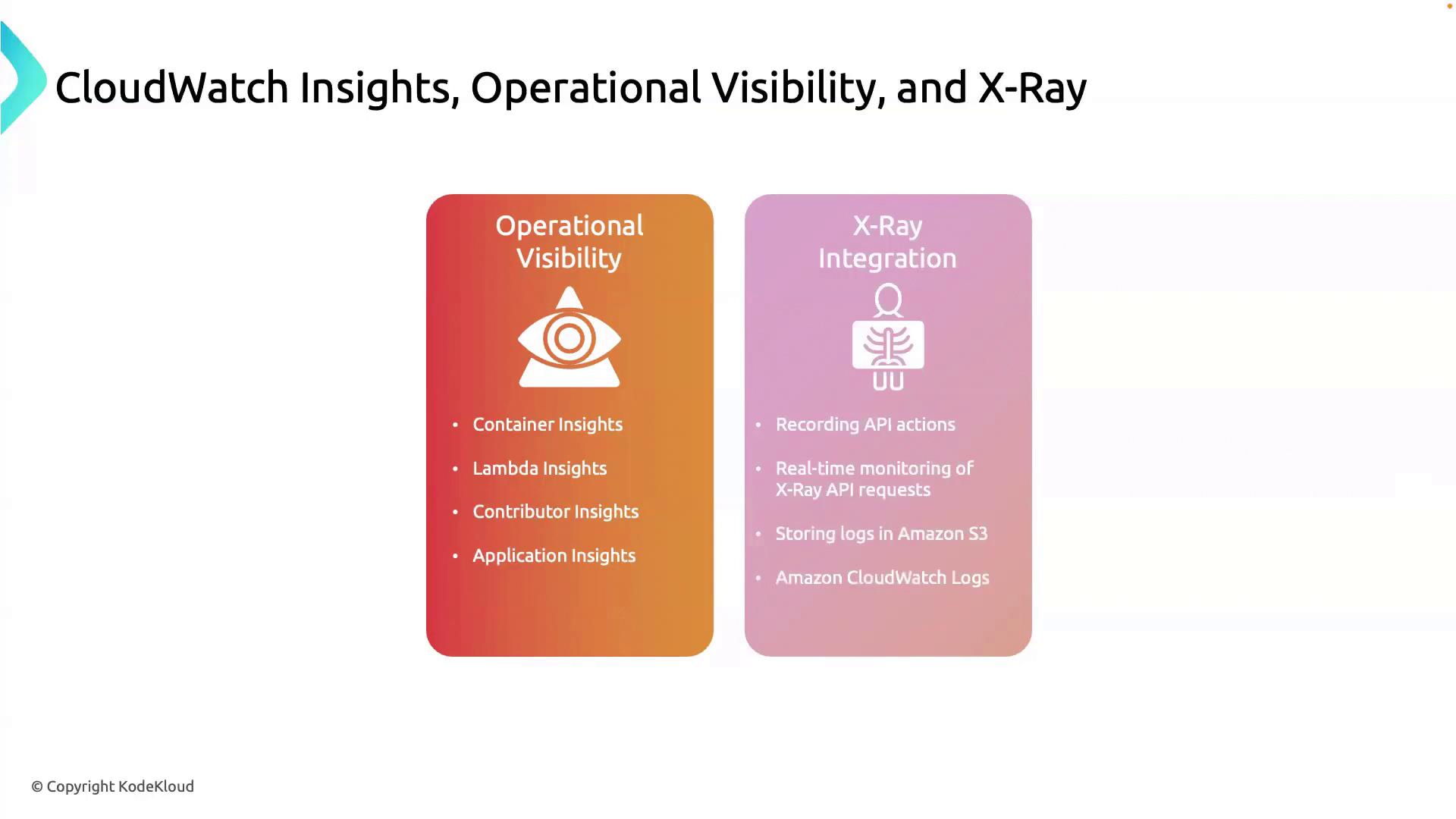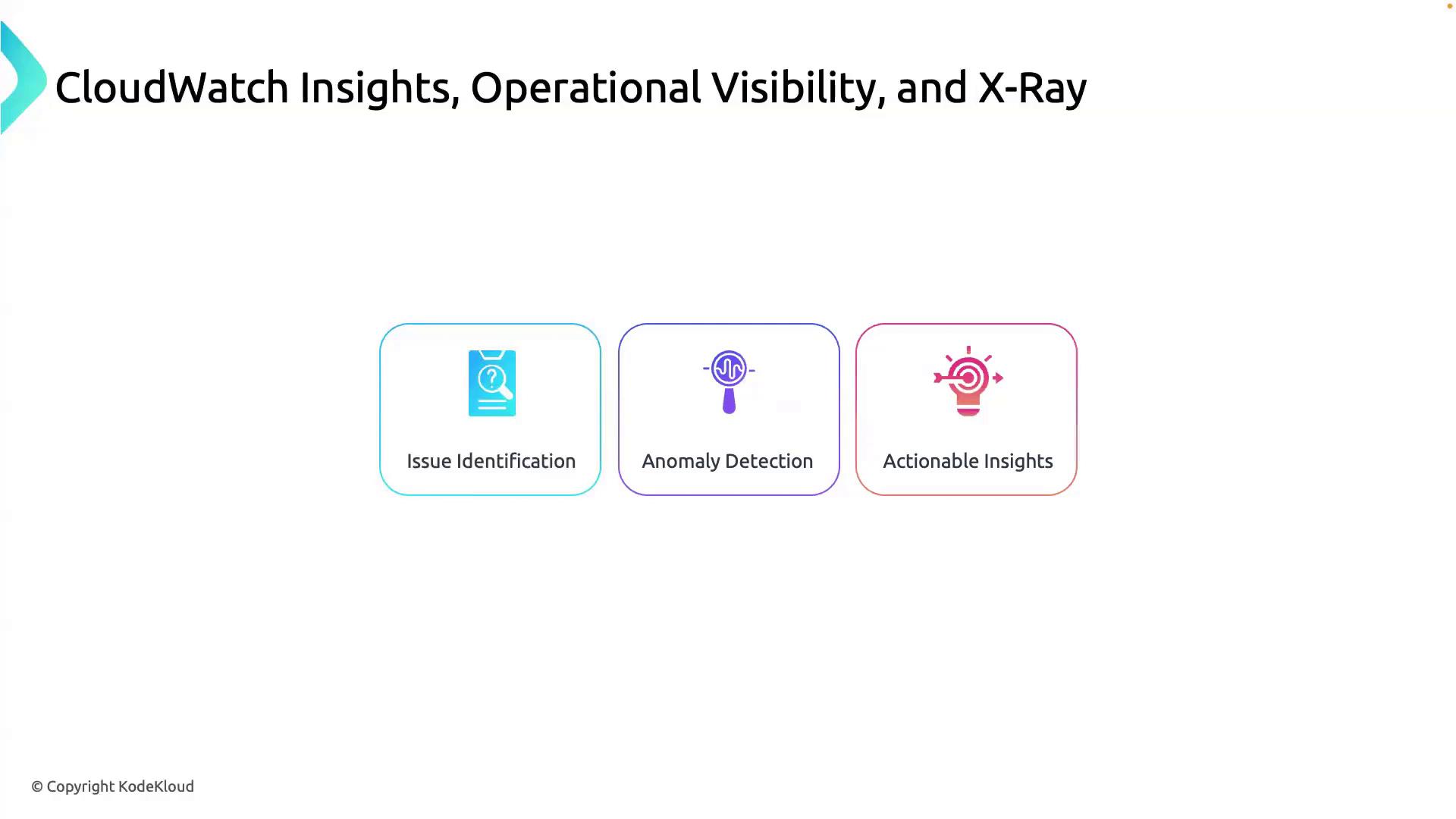AWS CloudWatch
Cloudwatch Insights X Ray and Service Map
Cloudwatch Insights and X Ray
In this lesson, you’ll learn how Amazon CloudWatch Insights and AWS X-Ray work together to deliver end-to-end monitoring and distributed tracing for modern applications. By combining detailed metrics, logs, and traces, you can detect issues faster, understand root causes, and automate responses.
1. CloudWatch Insights: Operational Visibility
CloudWatch Insights provides granular visibility into your application stack. With built-in dashboards and customizable queries, you can quickly pinpoint performance bottlenecks.
| Feature | Description | Example CLI Command |
|---|---|---|
| Container Insights | Monitor CPU, memory, and networking metrics for ECS, EKS, and Fargate workloads. | aws cloudwatch get-metric-data --metric-data-queries file://queries.json |
| Lambda Insights | Collect function-level metrics, logs, and duration histograms for AWS Lambda. | aws lambda list-functions |
| Contributor Insights | Identify top-N contributors to spikes in metrics like error rates or latency. | aws cloudwatch describe-contributor-insights |
| Application Insights | Automatically detect and visualize anomalies across metrics, logs, and events. | aws opsworks describe-applications |
Note
Use CloudWatch Logs Insights queries to filter, aggregate, and visualize log data in seconds.
For more details, see CloudWatch Logs Insights.
2. AWS X-Ray: Distributed Tracing
AWS X-Ray captures detailed trace data to help you understand service interactions and latency across distributed architectures:
- End-to-End Traces: Follow a request as it travels through multiple services.
- Service Map Visualization: View a graph of service dependencies and latency.
- Request Sampling: Control the volume of traces collected to balance cost and visibility.
- Storage in S3: Archive and analyze trace data using tools like Athena or EMR.

Note
Integrate X-Ray with CloudWatch Events to trigger automated alerts or Lambda functions when anomalies are detected.
Learn more at AWS X-Ray Developer Guide.
3. Integrating Insights & Tracing
By correlating CloudWatch metrics and logs with X-Ray traces, you get a holistic observability solution:
- Issue Identification
- Use CloudWatch Alarms to flag unusual metrics.
- Anomaly Detection
- Drill down with Logs Insights queries and trace segments.
- Actionable Insights
- Automate incident response with CloudWatch Events and Lambda.

Warning
Ensure that your services are instrumented correctly with the X-Ray SDK and that IAM roles grant permissions for both CloudWatch and X-Ray APIs. Failing to do so may result in incomplete trace data.
4. Proactive Issue Resolution
With combined observability:
- Detect anomalies before they affect end-users.
- Trace requests to their origin for root-cause analysis.
- Respond automatically using EventBridge rules and Lambda.
# Start a CloudWatch Logs Insights query
aws logs start-query \
--log-group-names "/aws/lambda/my-function" \
--start-time $(date -v-1H +%s) \
--end-time $(date +%s) \
--query-string "fields @timestamp, @message | sort @timestamp desc | limit 20"
# Retrieve recent X-Ray traces
aws xray get-trace-summaries \
--start-time $(date -v-1H +%Y-%m-%dT%H:%M:%SZ) \
--end-time $(date +%Y-%m-%dT%H:%M:%SZ)
Further Reading
Watch Video
Watch video content